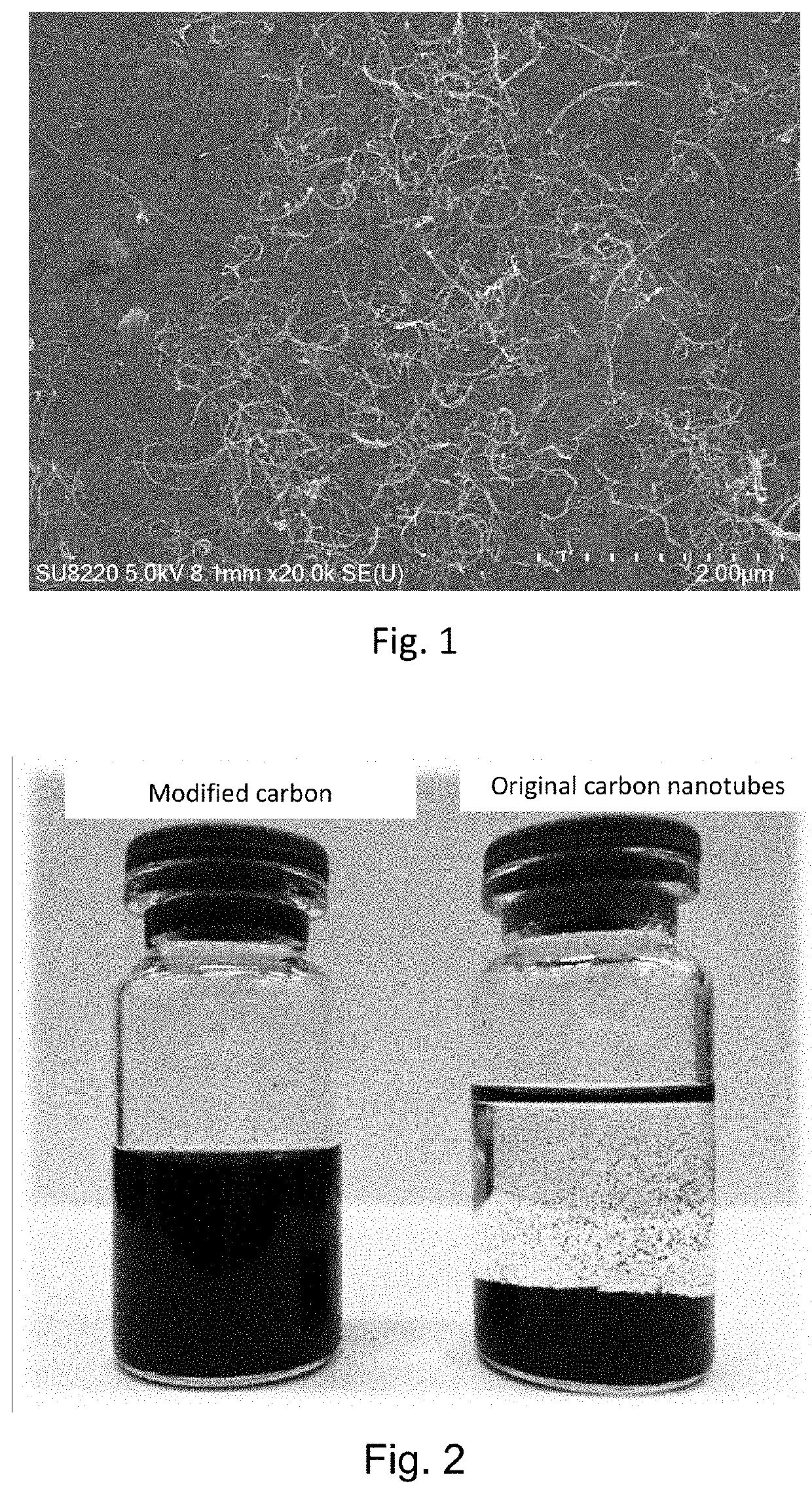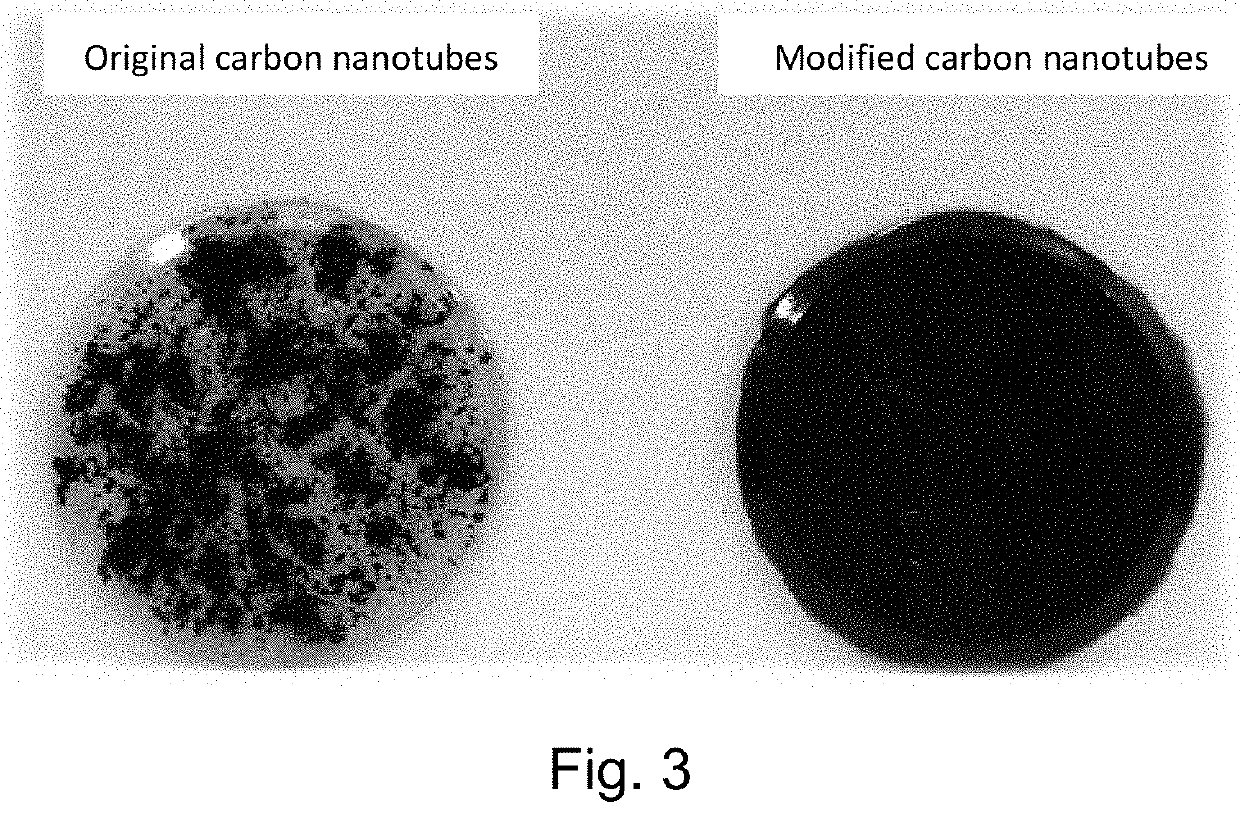Method for efficiently dispersing carbon nanotube
a technology of carbon nanotubes and dispersions, which is applied in the direction of carbon-silicon compound conductors, electrically conductive paints, coatings, etc., can solve the problems of reducing the length-diameter ratio of carbon nanotubes, restricting the application of carbon nanotubes, and entangled or agglomerated, so as to improve the performance of polymer composites. , the effect of high length-d
- Summary
- Abstract
- Description
- Claims
- Application Information
AI Technical Summary
Benefits of technology
Problems solved by technology
Method used
Image
Examples
example 1
[0035]Mixing, in parts by mass, 1 part of multi-walled carbon nanotubes (CNT-E3010, Zhongshan KANAITE Plastic Co., Ltd.), 0.5 part of carboxylated carbon nanotubes (containing a molar content of carboxyl of 1%, XF022, Nanjing XFNANO Materials Tech Co., Ltd.), and 120 parts of water uniformly, adjusting the pH to 8 with a sodium bicarbonate aqueous solution, and ultrasonically dispersing the resulting mixture for 1 h in a 100 W ultrasonic cleaner to obtain a stably dispersed carbon nanotube dispersion.
[0036]FIG. 1 shows a high-magnification SEM picture for characterizing the microscopic dispersion state of the dispersion of the functional carbon nanotube-dispersed carbon nanotubes (the stably dispersed carbon nanotube dispersion) obtained in Example 1 by using a scanning electron microscope (FE-SEM, SU-8200, Japan). It can be seen from the figure that carbon nanotubes could basically form a single-layer dispersion, but there were connecting junctions among the carbon nanotubes, and t...
example 2
[0042]Mixing, in parts by mass, 2 part of multi-walled carbon nanotubes (CNT-E3010, Zhongshan KANAITE Plastic Co., Ltd.), 2 part of hydroxylated carbon nanotubes (containing a molar content of hydroxyl of 1.5%, XF021, Nanjing XFNANO Materials Tech Co., Ltd.), and 800 parts of acetone uniformly, adjusting the pH to 8 with a sodium bicarbonate aqueous solution, and ultrasonically dispersing the resulting mixture for 1 h in a 100 W ultrasonic cleaner to obtain a stably dispersed carbon nanotube dispersion.
[0043]The apparent color of the obtained carbon nanotube dispersion was dark black, and the concentration of the same was 5 g / L. Upon measurement, the Zeta potential of the dispersion liquid was −60.8 mV, and the hydrated particle size was 583.2 nm; no precipitation was found after a centrifuge was used to centrifuge at 5000 r / min for 15 min, which proved that the carbon nanotube aqueous dispersion had good stability.
[0044]In the present invention, the E44 epoxy resin and the obtained...
example 3
[0045]Mixing, in parts by mass, 1 part of single-walled carbon nanotubes (CNT-E3010, Zhongshan KANAITE Plastic Co., Ltd.), 0.2 part of hydroxylated carbon nanotubes (containing a molar content of hydroxyl of 1.5%, XF021, Nanjing XFNANO Materials Tech Co., Ltd.), and 500 parts of ethanol uniformly, adjusting the pH to 9 with a sodium hydroxide aqueous solution, and ultrasonically dispersing the resulting mixture for 3 h in a 100 W ultrasonic cleaner to obtain a stably dispersed carbon nanotube dispersion.
[0046]The apparent color of the obtained carbon nanotube dispersion was dark black, and the concentration of the same was 0.24 g / L. Upon measurement, the Zeta potential of the dispersion liquid was −48.8 mV, and the hydrated particle size was 600.2 nm; no precipitation was found after a centrifuge was used to centrifuge at 5000 r / min for 15 min, which proved that the carbon nanotube aqueous dispersion had good stability.
[0047]In the present invention, the E44 epoxy resin and the obta...
PUM
| Property | Measurement | Unit |
|---|---|---|
| length | aaaaa | aaaaa |
| length | aaaaa | aaaaa |
| ultrasonic power | aaaaa | aaaaa |
Abstract
Description
Claims
Application Information
 Login to View More
Login to View More - R&D
- Intellectual Property
- Life Sciences
- Materials
- Tech Scout
- Unparalleled Data Quality
- Higher Quality Content
- 60% Fewer Hallucinations
Browse by: Latest US Patents, China's latest patents, Technical Efficacy Thesaurus, Application Domain, Technology Topic, Popular Technical Reports.
© 2025 PatSnap. All rights reserved.Legal|Privacy policy|Modern Slavery Act Transparency Statement|Sitemap|About US| Contact US: help@patsnap.com


